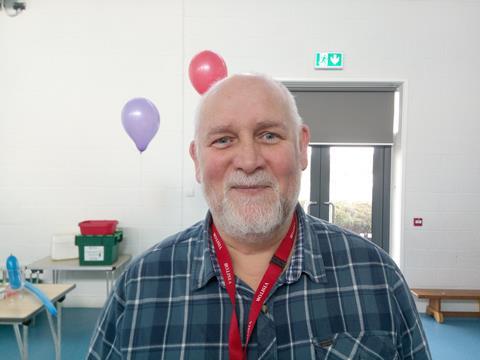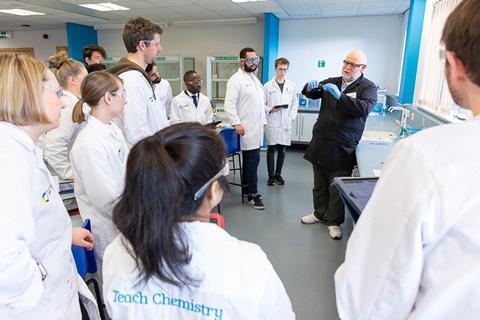Unsung hero of science outreach, Tim Harrison died in 2023. Read tributes from colleagues at the RSC and beyond

Known for his chemistry outreach work and as a staunch supporter of the Royal Society of Chemistry, Tim Harrison, who died in 2023, started his career as a chemistry teacher in 1980s London. In 2005, he joined the University of Bristol to lead a chemistry outreach programme for schools, and instantly began to make an impact on the lives of many young scientists.
Dudley Shallcross, professor of atmospheric chemistry at the University of Bristol and president of the RSC’s Education Community, recalls how Tim was an instant hit at his first outreach event for Bristol university: ‘He seemed to have an ability to react to the 16 year-old students’ unspoken responses and in so doing modified his approach as he went along. All great teachers do this without thinking but these 16 year-olds were transformed and transfixed by Tim, something we would witness time and time again.’
It was actually a meeting at an RSC school teacher event at the University of Birmingham that brought Tim and Dudley together and led to Tim taking on the role of school teacher fellow, seconded to Bristol’s School of Chemistry to work on outreach. That meeting also led to a lifelong friendship and many inspirational events for budding scientists across the UK and beyond.
Initially, Dudley and Tim took their outreach work to UK science festivals and schools, only venturing abroad in 2007 to Science on Stage in Grenoble. They presented A Pollutant’s Tale, a talk about air pollution and climate change for secondary school students, alongside the sister talk, Gases in the Air for younger learners. At that event, the chair described Tim as ‘better than Gore’, referring to Al Gore who was then touring the world with An Inconvenient Truth.
Taking the Pollutant’s Tale to 2008’s Sci-Fest Africa was another pivotal moment for Tim. That visit set the seeds for an outreach programme with Rhodes University, South Africa, which continues today. On that first visit, Tim met Joyce Sewry, now a lecturer at the university. Joyces cites Tim as inspiration for a module on the chemistry honours programme, which ‘requires students to embrace their civic responsibility to the wider community, outside of the university. Thus far, over 100 postgraduate students have presented A Pollutant’s Tale to several thousand rural and urban school learners spread across the Eastern and Western Cape regions of South Africa.’
Supporting teacher fellows

When David Read, professorial fellow-education at the University of Southampton, became an RSC school teacher fellow in 2007, the first thing he did was ring Tim. He recalls their 45-minute chat, during which Tim gave him ‘a plethora of ideas for projects and activities to work on. He invited me to Bristol to shadow him for a day, and I can still see the whoosh bottle and elephant’s toothpaste demonstrations.’ It wasn’t just a one-off encounter though.
‘Over the next 15 years, Tim continued to be an influence on my direction, despite the fact that my role evolved continually over that period,’ says David.
Around the time David made that phone call Nick Barker also met Tim. Nick was then a prospective RSC school teacher fellow and found himself being interviewed by Tim at the RSC’s Burlington House in London. He recalls the outcomes of that interview as ‘a new job and a new friend. I went to work at the University of Warwick, where I started a chemistry schools outreach programme. Tim was my guide and my inspiration.’
In subsequent years, Nick travelled ‘far and wide to join Tim in performing demonstration lectures for school audiences when Tim liked to pretend he was my technician. Tim would ask me not to tell him what experiments I had planned so that he had to guess what was coming next during the lecture. I tried very hard to catch him out, but his knowledge and comic timing meant that I always failed to trick him. Tim’s skills just made the lecture better. Tim knew how to use humour perfectly in a lecture; he could make an audience laugh and relax so that they would absorb the serious stuff and leave feeling encouraged and inspired.’
Mentoring trainee teachers
A member of the RSC since 1987, Tim became involved with the RSC teacher training programme in 2013. And he made an impression, both as a mentor and as a demonstrator. Fellow scholar mentor, teacher Catherine Smith remembers: ‘Tim loved nothing more than a good demonstration, and the larger the scale the better.’ Catherine delivered several CPD sessions alongside Tim for the scholarship programme. ‘And oh my, did we have fun,’ she laughs. ‘His expertise lay not only in his explanations of the chemistry behind each demonstration but also in the many, often humorous, stories that accompanied each and every one.
’Tim will be sorely missed but his legacy will live on with every methane bubble that is ignited in classrooms around the world,’ says Catherine.
Tim wasn’t just involved with teacher fellows and scholars. Sarah Robertson, RSC director of Education & Professional Practice recalls, he ‘generously gave his time to many different programmes and activities’. She adds, ‘I learned a lot from Tim about the world of outreach, which I was fortunate enough to build on through my ongoing connection with the school teacher fellows group that Tim convened. I’m sure many other members and colleagues at the RSC share my gratitude and appreciation for everything Tim contributed to our work.’
Summing up Tim’s contribution to chemistry outreach, students, trainee teachers and the wider education community is difficult, but Dudley manages it in three words: ‘a phenomenal educator’.
Many thanks to Dudley Shallcross for his contributions to this article.




















No comments yet